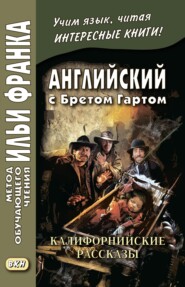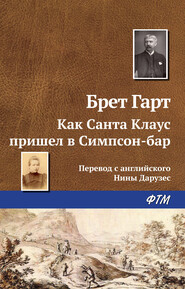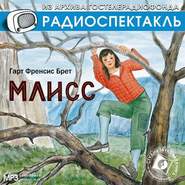По всем вопросам обращайтесь на: info@litportal.ru
(©) 2003-2024.
✖
Gabriel Conroy
Автор
Год написания книги
2017
Настройки чтения
Размер шрифта
Высота строк
Поля
The word in Sal's dialect had a various, large, and catholic significance. Mrs. Markle understood it, and repeated briefly —
"Olly – I must see her – right off!"
"Which?" continued Sal.
"Here," replied Mrs. Markle; "anywhere. Fetch her when ye kin."
"She won't come."
"Then I'll go to her," said Mrs. Markle, with a sudden and characteristic determination that closed the conversation and sent Sal back viciously to her unwashed dishes.
Whatever might have been the truth of Sal's report, there was certainly no general external indication of the facts. The newly-married couple were, to all appearances, as happy and contented, and as enviable to the masculine inhabitants of One Horse Gulch, as any who had ever built a nest within its pastoral close. If a majority of Gabriel's visitor were gentlemen, it was easily attributed to the preponderance of males in the settlement. If these gentlemen were unanimously extravagant in their praise of Mrs. Conroy, it was as easily attributable to the same cause. That Gabriel should dig purposeless holes over the hill-side, that he should for the time abandon his regular occupation in his little modest claim in the cañon, was quite consistent with the ambition of a newly-married man.
A few evenings after this, Gabriel Conroy was sitting alone by the hearth of that new house, which popular opinion and the tastes of Mrs. Conroy seemed to think was essential to his new condition. It was a larger, more ambitious, more expensive, and perhaps less comfortable dwelling than the one in which he has been introduced to the reader. It was projected upon that credit which a man of family was sure to obtain in One Horse Gulch, where the immigration and establishment of families and household centres were fostered even at pecuniary risks. It contained, beside the chambers, the gratuitous addition of a parlour, which at this moment was adorned and made attractive by the presence of Mrs. Conroy, who was entertaining a few visitors that, under her attractions, had prolonged their sitting until late. When the laugh had ceased and the door closed on the last lingering imbecile, Mrs. Conroy returned to the sitting-room. It was dark, for Gabriel had not lighted a candle yet, and he was occupying his favourite seat and attitude before the fire.
"Why! are you there?" said Mrs. Conroy, gaily.
Gabriel looked up, and with that seriousness which was habitual to him, replied —
"Yes."
Mrs. Conroy approached her lord and master, and ran her thin, claw-like fingers through his hair with married audacity. He caught them, held them for a moment with a kindly, caressing, and yet slightly embarrassed air that the lady did not like. She withdrew them quickly.
"Why didn't you come into the parlour?" she said, examining him curiously.
"I didn't admire to to-night," returned Gabriel, with grave simplicity, "and I reckoned you'd get on as well without me."
There was not the slightest trace of bitterness nor aggrieved sensitiveness in his tone or manner, and although Mrs. Conroy eyed him sharply for any latent spark of jealousy, she was forced to admit to herself that it did not exist in the quiet, serious man before her. Vaguely aware of some annoyance in his wife's face, Gabriel reached out his arm, and, lightly taking her around her waist, drew her to his knee. But the very act was so evidently a recognition of a certain kind of physical and moral weakness in the creature before him – so professional – so, as Mrs. Conroy put it to herself, – "like as if I were a sick man," that her irritation was not soothed. She rose quickly and seated herself on the other side of the fireplace. With the same implied toleration Gabriel had already displayed, he now made no attempt to restrain her.
Mrs. Conroy did not pout as another woman might have done. She only smiled a haggard smile that deepened the line of her nostril into her cheek, and pinched her thin, straight nose. Then she said, looking at the fire —
"Ain't you well?"
"I reckon not – not overly well."
There was a silence, both looking at the fire.
"You don't get anything out of that hill-side?" asked Mrs. Conroy at last, pettishly.
"No," said Gabriel.
"You have prospected all over the ridge?" continued the woman, impatiently.
"All over!"
"And you don't find anything?"
"Nothin'," said Gabriel. "Nary. Thet is," he added with his usual cautious deliberation, "thet is, nothin' o' any account. The gold, ef there is any, lies lower down in the gulch, whar I used to dig. But I kept at it jest to satisfy your whim. You know, July, it was a whim of yours," he continued, with a certain gentle deprecatoriness of manner.
A terrible thought flashed suddenly upon Mrs. Conroy. Could Dr. Devarges have made a mistake? Might he not have been delirious or insane when he wrote of the treasure? Or had the Secretary deceived her as to its location? A swift and sickening sense that all she had gained, or was to gain, from her scheme, was the man before her – and that he did not love her as other men had – asserted itself through her trembling consciousness. Mrs. Conroy had already begun to fear that she loved this husband, and it was with a new sense of yearning and dependence that she in her turn looked deprecatingly and submissively into his face and said —
"It was only a whim, dear – I dare say a foolish one. It's gone now. Don't mind it!"
"I don't," said Gabriel, simply.
Mrs. Conroy winced.
"I thought you looked disappointed," she said after a pause.
"It ain't that I was thinkin' on, July; it's Olly," said Gabriel.
There is a limit even to a frightened woman's submission.
"Of course," she said, sharply; "Olly, Olly again and always. I ought to have remembered that."
"Thet's so," said Gabriel with the same exasperating quiet. "I was reckonin' jest now, ez there don't seem to be any likeliness of you and Olly's gettin' on together, you'd better separate. Thar ain't no sense goin' on this way, July – no sense et all. And the worst o' the hull thing ez thet Olly ain't gettin' no kinder good outer it, no way!"
Mrs. Conroy was very pale and dangerously quiet as Mr. Conroy went on.
"I've allers allowed to send that child to school, but she don't keer to go. She's thet foolish, thet Olly is, thet she doesn't like to leave me, and I reckon I'm thet foolish too thet I don't like to hev her go. The only way to put things square ez this" —
Mrs. Conroy turned and fixed her grey eyes upon her husband, but she did not speak.
"You'd better go away," continued Gabriel, quietly, "for a while. I've heerd afore now that it's the reg'lar thing fur a bride to go away and visit her mother. You hain't got no mother," said Gabriel thoughtfully, "hev ye? – that's bad. But you was a sayin' the other day suthin' about some business you had down at 'Frisco. Now it would be about the nateral sort o' thing for ye to go thar fur two or three months, jest till things get round square with Olly and me."
It is probable that Gabriel was the only man from whom Mrs. Conroy could have received this humiliating proposition without interrupting him with a burst of indignation. Yet she only turned a rigid face towards the fire again with a hysterical laugh.
"Why limit my stay to two or three months?" she said.
"Well, it might be four," said Gabriel, simply – "it would give me and Olly a longer time to get things in shape."
Mrs. Conroy rose and walked rigidly to her husband's side.
"What," she said huskily, "what if I were to refuse?"
Gabriel looked as if this suggestion would not have been startling or inconsistent as an abstract possibility in woman, but said nothing.
"What," continued Mrs. Conroy, more rapidly and huskily, "what if I were to tell you and that brat to go! What," she said, suddenly raising her voice to a thin high soprano, "what if I were to turn you both out of this house —my house! off this land —my land! Eh? eh? eh?" she almost screamed, emphasising each interrogatory with her thin hand on Gabriel's shoulder, in a desperate but impotent attempt to shake him.
"Certingly, certingly," said Gabriel calmly. "But thar's somebody at the door, July," he continued quietly, as he rose slowly and walked into the hall.
His quick ear had detected a knocking without, above the truculent pitch of Mrs. Conroy's voice. He threw open the door, and disclosed Olly and Sal standing upon the threshold.
It is scarcely necessary to say that Sal was first to recover the use of that noble organ, the tongue.
"With chills and ager in every breath – it's an hour if it's five minutes that we've stood here," she began, "pounding at that door. 'You're interrupting the young couple, Sal,' sez I, 'comin' yer this time o' night, breakin' in, so to speak, on the holiest confidences,' sez I; 'but it's business, and onless you hev thet to back you, Sarah Clark,' I sez, 'and you ain't a woman ez ever turned her back on thet or them, you ain't no call there.' But I was to fetch this child home, Mrs. Conroy," continued Sal, pushing her way into the little sitting-room, "and" —
She paused, for the room was vacant. Mrs. Conroy had disappeared.

















